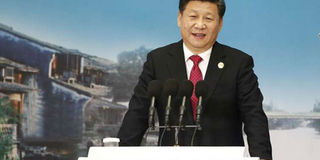Chinese leader out to show clout in Middle East

Chinese President Xi Jinping delivers a speech during the World Internet Conference in Wuzhen, east China's Zhejiang province on December 16, 2015. President Jinping is scheduled to visit Saudi Arabia, Egypt, and Iran beginning January 18, 2016. PHOTO | AFP
What you need to know:
- Iran, which is Shiite and has emerged as a defender of lesser millions of them, has so far considered itself an Islamic Republic since the revolution in 1979.
- Saudi Arabia, like Iran, has little to boast about in upholding human rights. Its clout has been based on petroleum, now accepted as an infinite commodity.
Chinese President Xi Jinping is scheduled to visit Saudi Arabia, Egypt, and Iran beginning Monday.
That brings to four world’s warmongering nations and nuclear powers in the conflict plagued Middle East.
That’s in addition to the United States, a perennial loser there, Russia, now busy trying to encircle Turkey, a member of the Nato and currently backing butcher President Bashir Assad of Syria—an Adolf Hitler-type reincarnate.
Israel is the fourth. It denies having nuclear capability, let alone the bomb.
After all, “The Lord is my Sheppard, “says the Psalms, but “just in case,” so sang an American satirist Tom Lehrer, “We got to get the bomb.” He was right.
The CCTV announcement on Sunday of Xi’s planned visit—such occurrences are toss-ups these days, terrorism and suicide bombers galore—was surprisingly brief.
The television network actually quoted the Chinese ambassador to Saudi Arabia.
“Saudi Arabia is located at the junction point of the Silk Road Economic Belt and Maritime Silk Road. Saudi Arabia is also one of the founding members of Asian Infrastructure Investment Bank. I think by building the one Belt and One Road together, the two countries can share stronger, deeper and long-lasting relations, which will also help push forward international and regional issues,” said Li Chengwen, the ambassador.
DEFENDER OF SUNNI MUSLIMS
Well, Saudi Arabia and Iran aren’t, so far, interested in anything silky.
They are after raw domination of the Middle East.
Their supporters, the Unites States (and trailers) for the Saudis and Russian, for Iran—the latter through fear of sleeping next to an elephant acquiesces—are fighting a proxy war.
Saudi Arabia makes no bones about being a kingdom and defender of Sunni Muslims, and there are millions of them.
Iran, which is Shiite and has emerged as a defender of lesser millions of them, has so far considered itself an Islamic Republic since the revolution in 1979.
The overthrow of Reza Shah his policing role in the Gulf on behalf of the United States and trailers.
Luckily a counter-balancing power, Saddam Hussein’s Iraq existed. The United States did away with that. Iran is on the loose.
It’s navy is all over the Gulf, parts of Indian Ocean farther to Massawa, Eritrea.
Its proxies are fighting in Iraq, Syria, and Lebanon. The Shah would be envious.
Sharif Nashashili, writing for Aljazeera, gave a few examples of Iran’s intentions.
For example, he quoted a senior political and security figures saying “Iran is now an empire;” praising “increasing export of the Islamic Revolution the export of the revolution going from “Bahrain to Iraq and from Syria to Yemen and North Africa.”
POWER POSITION
Saudi Arabia, like Iran, has little to boast about in upholding human rights. Its clout has been based on petroleum, now accepted as an infinite commodity.
Incidentally, Iran, an oil producer, knows that. For long-term purposes, these countries need to control territory and trade routes for whatever resources that might replace oil.
Religion is for whipping up emotions of often gullible masses.
Mr Xi is supposedly going to Saudi Arabia, its struggling client, Egypt and Iran waving neutrality banner.
The catch: Whatever the outcome of Saudi-Iranian rivalry is, China retains a foothold on the silk roads and seas.




